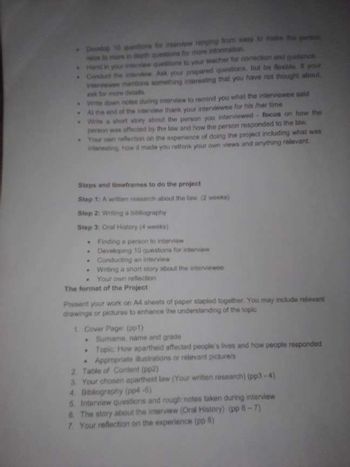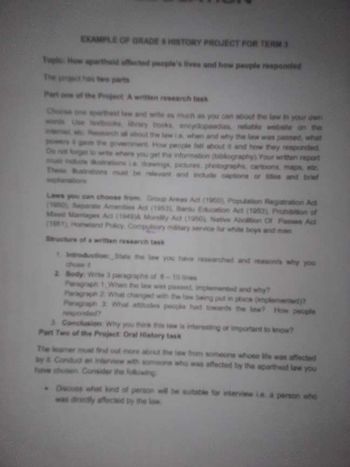Question

Transcribed Image Text:Develop 10 tons for interview ranging from way to make the person
sx to more in depth questions for more information
Hand in your interview questions to your teacher for correction and dance
Conduct the interview Ask your prepared questions, but be flexible it your
Interviewee mentions something interesting that you have not thought about.
ask for more details
Wite down notes during interview to remind you what the interviewee said
Al the end of the interview thank your interviewee for his/her time
story about the person you interviewed focus on how the
person was affected by the law and how the person responded to the low
Your own reflection on the experience of doing the project including what was
esting how it made you rethink your own views and anything relevant
Steps and timeframes to do the project
Step 1: A written research about the law. (2 weeks)
Step 2: Writing a bibliography
Step 3: Oral History (4 weeks)
.
Finding a person to interview
Developing 10 questions for interview
Conducting an interview
Writing a short story about the interviewee
Your own reflection
The format of the Project
Present your work on A4 sheets of paper stapled together. You may include relevant
drawings or pictures to enhance the understanding of the topic
1. Cover Page (pp1)
Sumame, name and grade
Topic: How apartheid affected people's lives and how people responded
Appropriate illustrations or relevant pictures
2 Table of Content (pp2)
3. Your chosen apartheid law (Your written research) (pp3-4)
4. Bibliography (pp4-5)
5. Interview questions and rough notes taken during interview
& The story about the interview (Oral History) (pp 6-7)
7. Your reflection on the experience (pp-8)

Transcribed Image Text:EXAMPLE OF GRADE HISTORY PROJECT FOR TERM 3
Top How apartheid affected people's lives and how people responded
The project
two parts
Part of the Project A wetten research lask
Choose one aparthest law and wife as much as you can about the law in your own
word Use st
wy books encyclopaedias reliable website the
Rth all about the law is, when and why the law was passed, what
the government How people fell about it and how they responded
De get to write where you get the information (bibliography) Your written report
mat dude raione La drawmgs, pictures, photographs, carbons, maps, ac
These anions must be relevant and include captions or is and brief
powers
pitanatic
Laws you can choose from Group Areas Act (1960) Population Registration Act
10 Saparate Amenities Act (1953) Bant Education Act (1953) Prohibition of
Man Marages Ad (1949) Molly Act (1950), Native Abolition Of Passes Act
(188) Howland Policy Compulsory military service for white boys and men
Structure of a written research task
1 Introduction State the law you have
chose t
arched and reasons why you
2 Body Wite 3 paragraphe of
10ines
Paragraph 1 When the law was passed, implemented and why?
Paragraph 2 What changed with the law being put in place (mplemented?
Paragraph 2: What attitudes people had towards the law? How people
responded?
3. Conclusion Why you think this low is interesting or important to know?
Part Two of the Project Oral History task
The leamer must find out more about the law hom someone whose life was affected
by & Conduct an interview with someone who was affected by the apartheid law you
have chosen Consider the following
Discuss what kind of person will be suitable for interview Le a person who
was directly affected by the low
Expert Solution
This question has been solved!
Explore an expertly crafted, step-by-step solution for a thorough understanding of key concepts.
Step by stepSolved in 2 steps
